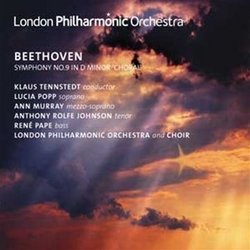The last Ninth you'd expect to be released in 2009
Erik Ketzan | Orbis Tertius | 02/24/2009
(4 out of 5 stars)
"In case anyone was considering it, this is obviously not the first Beethoven's Ninth one should buy. For greater, more important recordings, see Karajan, Zinman, Szell, and many others.
But for the classical fan well-versed in Beethoven's Ninth, this recording is an important, perhaps even essential addition to the field. One would expect a CD released in 2009 to be something new, fresh, a 21st century Ninth, perhaps. But on the contrary, Tennstedt's Ninth is gloriously old-fashioned, closer to 19th century Beethoven performance than anything else.
It's just a pity this wasn't recorded better. The fact that it's from a live performance in 1992 is not the problem-- I didn't notice any coughs or noises that particularly distracted from the enjoyment of the music. The problem is that the recording itself is flat and murky throughout. I have read that the cavernous Royal Festival Hall may be to blame, but whatever the cause (bad microphone placement or mixing? who knows?), the result is undeniably deficient when compared to almost any stereo recording dating back to even the 1960s. That said, it's still possible to enjoy the piece immensely despite the weak recording; it's not THAT bad, it's just a pity a proper recording of this unique interpretation will never exist.
Tennstedt takes the first movement rather slow, at 16:53 (Furtwängler pushed 18 minutes, Karajan and Szell clock in at 15:33, while Zinman zips along at under 14 minutes), and like Fürtwangler makes it big and magisterial. In contrast, Tennstedt blazes through the second movement in 9:23 minutes (all the radically different conductors mentioned above keep it around 11-12 minutes). It seems that, in the only movement which does not lend itself to slowly drawn-out majesty, Tennstedt wants to zip on through.
***9/22/09 EDIT - apparently Tennstedt omits repeats in the second movement that make his recording of it shorter than other conductors'. That said, I believe my original comment still stands; Tennstedt does not seem to want to linger overly long in second movement.***
The third movement may be Tennstedt's best. The critic Norman Lebrecht praised the "agonised tenderness" of this adagio in a recent review of the disk. Like the first movement, Tennstedt takes this one slow, at almost 19 minutes (compared with Furtwängler at 19:32, typical performance at 15-16 minutes, and Zinman at the lightning speed 11:32).
Tennstedt's fourth movement at 26:51 is longer than most everybody esle's (most of which clock at 24-25 minutes). The four wonderful soloists are, thankfully, better recorded than the orchestra (it seems that the microphones were in front of their faces), especially the outstanding German bass René Pape.
In sum, a big, wooly Ninth from another time."

